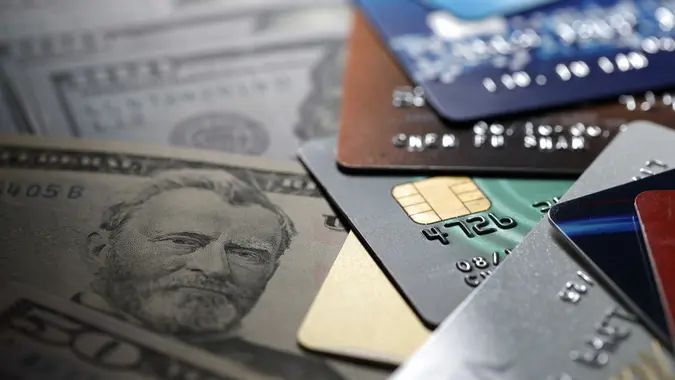How To Open Your First Credit Card

Commitment to Our Readers
GOBankingRates' editorial team is committed to bringing you unbiased reviews and information. We use data-driven methodologies to evaluate financial products and services - our reviews and ratings are not influenced by advertisers. You can read more about our editorial guidelines and our products and services review methodology.

20 Years
Helping You Live Richer

Reviewed
by Experts

Trusted by
Millions of Readers
If you’re shopping around for your first credit card, congratulations — and beware. You’re about to start a journey that will influence what you can buy, where you can live, and what jobs you can get for the rest of your life. If you make a mistake, don’t panic. You’ll have plenty of time to bounce back — but do take it seriously.
Generation Z: The Future of Finances
Learn More: Gen Z Has Strong Opinions on Capitalism -- Do Experts Agree?
Handled responsibly, this one card can help you build your standing among lenders, employers, sellers, and insurers. But if you treat it frivolously, it will be the first step on a long road of being passed over for the best offers and spending more money than you should. Here’s what you need to know.
Understand Just What it is You’re Getting Into — and Get Into it Slowly
Having a card will make you want to use your card — but you’d be wise to ease into it.
“Using credit cards for purchases can make it much harder to stick to a budget than using cash or a debit card,” said Brian Walsh, senior manager and CFP at SoFi. “Studies show that consumers who use cash instead of credit cards tend to spend less money because they’re more conscientious about price and discerning when it comes to impulse purchases. You’re also guaranteed that you won’t go over budget.”
A credit card is almost certain to do more harm than good if you don’t start with good money habits, which Walsh says includes sticking to a budget, paying bills ahead of time, and especially setting aside emergency savings.
“An emergency fund is one of the best ways to make sure you’re not relying on credit cards to make ends meet,” Walsh said.
Find Out: Explore the Cost of Education in the United States
Follow Along: 31 Days of Living Richer
Lay the Groundwork, Identify Your Card and Manage Your Expectations
Since submitting an application requires a “hard pull” on your credit, the goal isn’t to cast a wide net. Instead, hone in on an individual card that’s most likely to accept you and apply to only that one. Many lenders like Discover allow you to see which cards you’re preapproved for without a hard pull before you apply.
In the very beginning, that won’t be any of the popular cards with exotic rewards that you see famous actors shilling on TV. They’re for people with long, strong credit histories. Your credit history — and the score that will measure it for the rest of your life — begins with that first hard pull, according to Experian.
When it does come time to apply, you’ll need your Social Security number and identifying information like your birthday and address as well as your annual income.
Check Out: How To Safely Get Back Into Using a Credit Card If You’ve Had a Bad Experience With Debt
So, How Do You Get a Credit Card With No Credit Score?
The average 18-year-old who is building credit has a score of 631, according to Credit Sesame. That’s probably enough to qualify for a top-tier student credit card or a good mainstream card — but you have to work up to that. So how do you build credit before you get credit?
- You might have to start with a secured card, which requires a cash deposit but reports your on-time payments to the credit bureaus to help you build your credit.
- Convincing a parent or other established cardholder to take you on as an authorized user is one of the fastest and easiest ways to strengthen your credit. According to Credit Sesame, the average person who uses this strategy sees their fledgling credit score grow by nearly 80 points in just 18 months.
- If you have a job, you might consider a credit-builder loan, which is a savings account or CD that you build up with monthly payments, which the lender reports to the credit bureaus.
Try Now: 90-Second Moves To Raise Your Credit Score 200 Points
Treat This Card Like it’s Your Only First Chance to Start Strong — Because it Is
Remember, this is the card that will build or destroy your credit right out of the gate. Take it seriously.
“Once you’re able to qualify for a card, be sure to focus on using it responsibly,” said Lisa Fischer, chief lending and growth officer at Mission Lane, a financial services company that caters to borrowers with poor or limited credit histories. “Make all your payments on time and try to contribute more than the minimum payment, or better yet, in full, if that is possible for your financial situation. If you only pay the minimum amount due each month, it may hurt your score and make it harder to pay off future expenses by adding interest to your bill. Also, be smart with your spending and use your cards for needs, not wants, and don’t be afraid to seek guidance if you’re having trouble managing your expenses.”
 Written by
Written by  Edited by
Edited by 
























